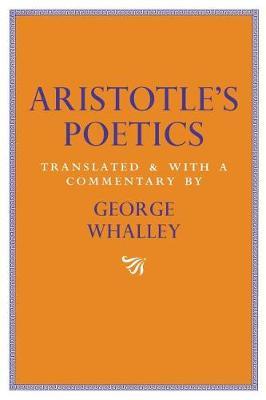Overview
This text combines a complete translation of Aristotle's ""poetics"" with a running commentary, printed on facing pages, to keep the reader in continuous contact with the linguistic and critical subtleties of the original while highlighting crucial issues for students of literature and literary theory. The volume includes two essays by George Whalley that outline his method and purpose. He identifies a deep congruence between Aristotle's understanding of mimesis and Samuel Taylor Coleridge's view of imagination.
Full Product Details
Author: Aristotle ,
John Baxter ,
J.P. Atherton ,
John Baxter
Publisher: McGill-Queen's University Press
Imprint: McGill-Queen's University Press
Dimensions:
Width: 15.20cm
, Height: 1.80cm
, Length: 22.90cm
Weight: 0.300kg
ISBN: 9780773516120
ISBN 10: 0773516123
Pages: 224
Publication Date: 24 October 1997
Audience:
Professional and scholarly
,
Professional & Vocational
Format: Paperback
Publisher's Status: Active
Availability: In Print

This item will be ordered in for you from one of our suppliers. Upon receipt, we will promptly dispatch it out to you. For in store availability, please contact us.
Reviews
"""Whalley has produced precisely the kind of volume that is needed if the Poetics is to be successfully and seriously taught at the college level. This is the only edition of the Poetics that can truly claim to introduce adequately to a reader with no knowledge of Greek the problems and issues posed by the language of Aristotle's arguments. No current edition in use at the college level brings its readers to the same level of understanding of Aristotle's text that Whalley achieves in his translation and especially in his presentation of classical scholarship through the notes prepared for this edition."" David Ferris, Department of Comparative Literature, Queens College and the Graduate School, City University of New York"
Whalley has produced precisely the kind of volume that is needed if the Poetics is to be successfully and seriously taught at the college level. This is the only edition of the Poetics that can truly claim to introduce adequately to a reader with no knowledge of Greek the problems and issues posed by the language of Aristotle's arguments. No current edition in use at the college level brings its readers to the same level of understanding of Aristotle's text that Whalley achieves in his translation and especially in his presentation of classical scholarship through the notes prepared for this edition. David Ferris, Department of Comparative Literature, Queens College and the Graduate School, City University of New York
Whalley has produced precisely the kind of volume that is needed if the Poetics is to be successfully and seriously taught at the college level. This is the only edition of the Poetics that can truly claim to introduce adequately to a reader with no know
Author Information
Aristotle (384-322 BC) was born in the city of Stagira. At the age of seventeen or eighteen he came to Athens and became a student at Plato's Academy, where he remained for twenty years. Later he was appointed head of the royal academy in the kingdom of Macedon, where he tutored, among others, the king's son, Alexander. By 335 BC, Aristotle had returned to Athens, where he established a school known as the Lyceum. He conducted courses at the Lyceum for twelve years, and it is believed that he wrote most of his works during that time. His works constitute the first comprehensive system of philosophical and empirical knowledge. His influence on all subsequent philosophy and science is profound; the medieval Muslim scholars called him the ""First Teacher"" and the Scholastics referred to him simply as ""The Philosopher.""



